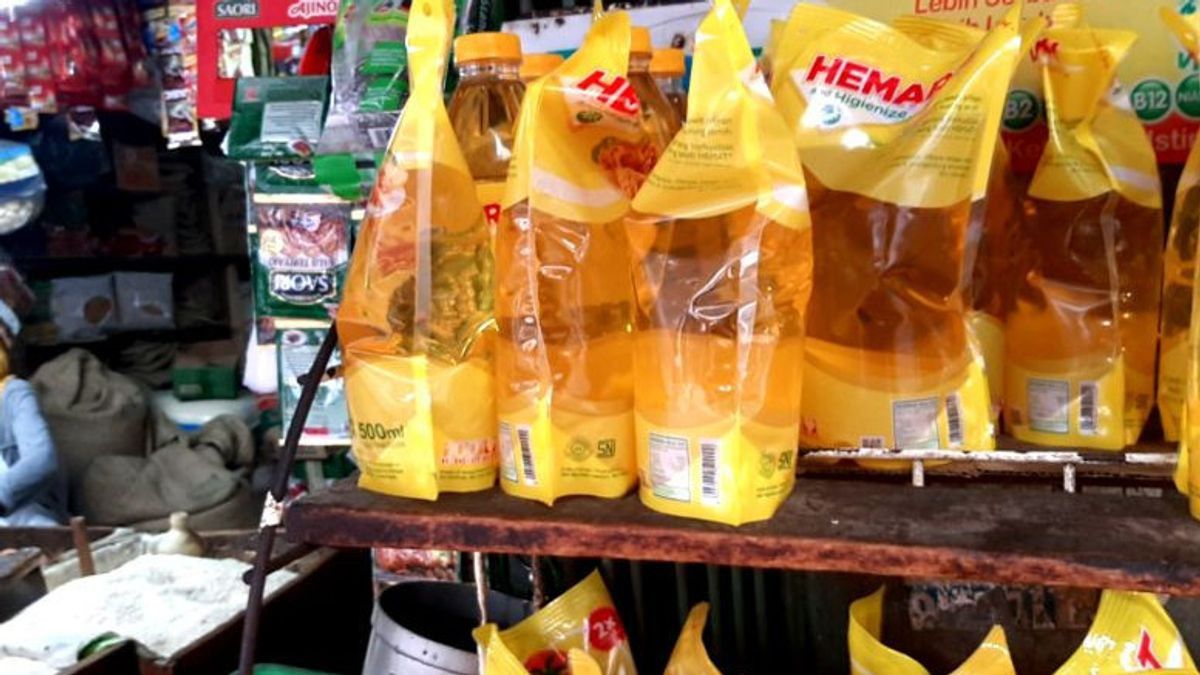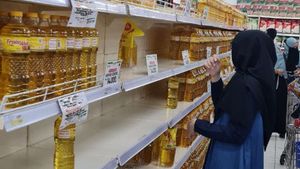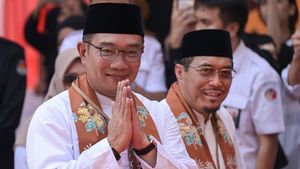JAKARTA - The problem of soaring cooking oil prices continues to haunt people in Indonesia. Since the end of 2021, the problem of goods that are attached to the kitchen has not found a solution. The policy taken by the government by setting the Highest Retail Price of IDR 14 thousand is considered a breeze.
The price of cooking oil did not go down, in fact, the problem grew again because it became scarce. This condition then raises the suspicion that there is a cartel game that makes one of the derivative products from palm oil so expensive, even disappears in the market.
In fact, Indonesia is the largest producer of crude palm oil (CPO) in the world. According to data from the Indonesian Palm Oil Association (Gapki), Indonesia's CPO production continued to increase between 2017-2019.
In 2017 Indonesia's CPO production showed 38.16 million tons. This number continues to increase: 43.1 million tons (2018), 47.18 million tons (2019). In 2020, CPO production decreased slightly by 47.03 million tons, and to 46.88 million tons in 2021.

In addition to being the largest producer, Indonesia is also the number one exporter of crude palm oil in the world. But then the Indonesian government plans to reduce exports of crude palm oil, and replace it with exports of derivative products of crude palm oil, one of which is cooking oil.
KPPU and Ministry of Trade are not compact
Back to the issue of the alleged role of cartels in the case of rising prices and scarcity of cooking oil in Indonesia. The Business Competition Supervisory Commission (KPPU) was the first to shout that it was suspected that a cartel was playing, so that there was turmoil about cooking oil.
"This cooking oil company is relatively raising prices together even though they each have their own oil palm plantations. This kind of behavior can be interpreted as a signal that there is a 'cartel'," said KPPU Commissioner Ukay Karyadi, January 20, 2022.
Based on the concentration ratio (CR) data collected by KPPU in 2019, it can be seen that around 40 percent of the cooking oil market share is controlled by four large companies that also have plantation businesses, CPO processing, and several CPO derivative products such as biodiesel, margarine, and cooking oil.

The indication that there is a cartel game (relationships between several entrepreneurs or producers in terms of production to marketing, with the aim of setting prices to limit supply and competition) made by the KPPU has been denied by the Government of Indonesia through the Ministry of Trade (Kemendag).
"How come it has only been detected now that there is unhealthy competition, oligopoly? It should have happened a long time ago, even though the KPPU has not yet been formed, this palm oil (industry) has started. Only because the price of cooking oil has gone up high, it seems as if from upstream to downstream it must be addressed. We will overhaul the international order that was built by Indonesia, I don't think so," said Oke Nurwan, Director General of Domestic Trade at the Ministry of Trade, Thursday, February 3.
Case 20 Cooking Oil Producers
There is a satire saying that: Indonesians are forgiving, as well as forgetful. That's what happened in the case of the alleged cartel game in the cooking oil chaos in this country.
Based on data from the Ministry of Trade's portal on Cooking Oil Commodities dated February 4, 2011, cartel practices have occurred in cooking oil affairs in Indonesia. In the 84-page report that can be accessed online, the role of cartels is listed on page 41, Chapter 4 Domestic Markets and Distribution, Article 4.1: Structure of Local Markets.

In that section it was written: “The government is asked to intervene in the cooking oil distribution system through reforming the trade system and setting an upper limit to maintain price stabilization. Currently, the distribution of cooking oil is carried out by the producers themselves. The Head of the Business Competition Supervisory Commission (KPPU) explained that cooking oil is included in the category of oligopolistic market structure where there is imperfect competition.
In May 2010, KPPU once punished 20 cooking oil producers by requiring them to pay a total fine of IDR 299 billion for being proven to have formed a cartel. The cartel was formed with the aim of regulating the price of cooking oil.
In the KPPU's decision it was stated that only PT Nagamas Palmoil Lestari did not violate Article 5 of Law Number 5 of 1999 concerning the Prohibition of Monopolistic Practices and Unfair Business Competition.
A total of 18 companies that were proven to have violated Article 5, namely the prohibition of entering into agreements with competitors to determine the selling price of bulk cooking oil products, were: PT Multimas Nabati Asahan, PT Sinar Alam Permai, PT Wilmar Nabati Indonesia, PT Multi Nabati Sulawesi, PT Agrindo Indah Persada, PT Musim Mas, PT Intibenua Perkasatama, PT Megasurya Mas, PT Agro Makmur Raya, PT Miko Oleo Nabati Industri, PT Indo Karya Internusa, PT Permata Hijau Sawit, PT Nubika Jaya, PT Smart Tbk, PT Tunas Baru Lampung, PT Berlian Eka Sakti Tangguh, PT Pacific Palmindo Industri, and PT Asian Agro Agung Jaya.
A total of nine companies were convicted of violating the same article for the packaged cooking oil market, namely: PT Multimas Nabati Asahan, PT Sinar Alam Permai, PT Multi Nabati Sulawesi, PT Miki Oleo Nabati Industri, PT Smart Tbk, PT Salim Ivomas Pratama, PT Bina Karya Prima, PT Tunas Baru Lampung, and PT Asian Agro Agung Jaya. PT Salim Ivomas Utama and PT Bina Karya Prima are not involved in the bulk cooking oil cartel.

The nine companies were proven to have violated Article 11 of Law No. 5 of 1999, which prohibits business actors from entering into agreements with their competitors to influence prices by regulating the production and marketing of goods. This results in monopolistic practices or unfair business competition.
Twenty companies involved in the cooking oil cartel were fined IDR 1 billion to IDR 25 billion. The practice of the 20 companies' cartels caused losses to consumers of up to IDR 1.5 trillion during April-December 2008.
Lose in Court
The group of 20 cooking oil producers brought this case to court, to challenge the KPPU's decision. The Central Jakarta District Court won them on February 24, 2011, and decided that the KPPU should overturn the decision on the cooking oil cartel.
The KPPU's basis for imposing a sentence is seen as not strong enough, because it is only based on indirect evidence. This method cannot be used in competition law in Indonesia.
KPPU filed an appeal against the decision of the Central Jakarta District Court to the Supreme Court. But again, KPPU lost, after the appeal was rejected by the Supreme Court.
So if now there are allegations of cartel practice indications in the cooking oil chaos in Indonesia, it is reasonable because it has happened before.
VOIR éGALEMENT:
The English, Chinese, Japanese, Arabic, and French versions are automatically generated by the AI. So there may still be inaccuracies in translating, please always see Indonesian as our main language. (system supported by DigitalSiber.id)














